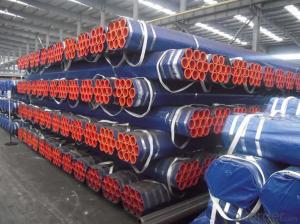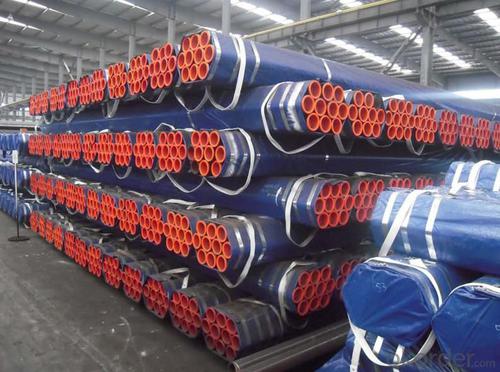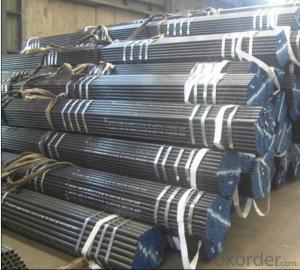Seamless steel tube balck ASTMA106 GRADE B
- Loading Port:
- Tianjin
- Payment Terms:
- TT or LC
- Min Order Qty:
- 25 m.t.
- Supply Capability:
- 5000 m.t./month
OKorder Service Pledge
OKorder Financial Service
You Might Also Like
1、Structure of Seamless steel tube balck ASTMA106 Description:
Seamless pipe is formed by drawing a solid billet over a piercing rod to create the hollow shell. As the manufacturing process does not include any welding, seamless pipes are perceived to be stronger and more reliable. Historically seamless pipe was regarded as withstanding pressure better than other types, and was often more easily available than welded pipe.
2、Main Features of the Seamless steel tube balck ASTMA106:
• High manufacturing accuracy
• High strength
• Small inertia resistance
• Strong heat dissipation ability
• Good visual effect
• Reasonable price
3、Seamless steel tube balck ASTMA106 Images:
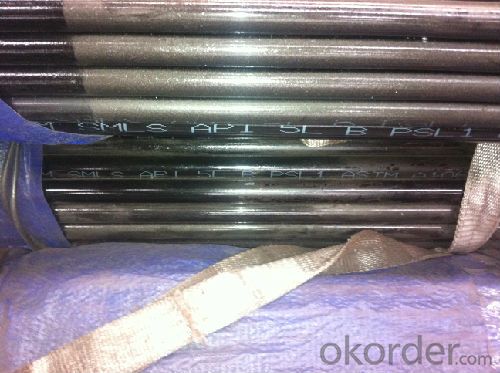
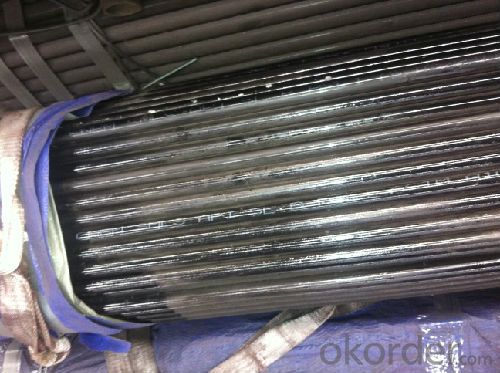
Packaging & Delivery
Packaging Details: | seaworthy package,bundles wrapped with strong steel strip |
Delivery Detail: | 15-30days after received 30%TT |
4、Seamless steel tube balck ASTMA106 Specification:
Standard | GB, DIN, ASTM |
Grade | 10#-45#, 16Mn |
Thickness | 8 - 33 mm |
Section Shape | Round |
Outer Diameter | 133 - 219 mm |
Place of Origin | Shandong, China (Mainland) |
Secondary Or Not | Non-secondary |
Application | Hydraulic Pipe |
Technique | Cold Drawn |
Certification | API |
Surface Treatment | factory state or painted black |
Special Pipe | API Pipe |
Alloy Or Not | Non-alloy |
Length | 5-12M |
Outer Diameter | 21.3-610mm |
Grade | 20#, 45#, Q345, API J55, API K55, API L80, API N80, API P110, A53B |
Standard | ASME, ASTM |
1.Material:20#(ASTM A 106/A53 GRB.API5LGRB,GB),45#,16Mn,10#.
2.Specification range:OD:21.3-610mm,WT:6-70mm,length:6-12m or according to the requirement of clients.
3.Excutive standards:GB,ASME API5L.ASTM A 106/A53,Despite of the above standards,we can also supply seamless steel pipe with standard of DIN,JIS,and so on,and also develop new products according to the requirements of our clients!
4.Surface:black lacquered,varnish coating or galvanized.
5.Ends:Beveled or square cut,plastic capped,painted.
6.Packing:bundles wrapped with strong steel strip,seaworthy packing.
5、FAQ of Seamless steel tube balck ASTMA106:
①How is the quality of your products?
Our products are manufactured strictly according to national and internaional standard, and we take a test
on every pipe before delivered out. If you want see our quality certifications and all kinds of testing report, please just ask us for it.
Guaranteed: If products’ quality don’t accord to discription as we give or the promise before you place order, we promise 100% refund.
②How about price?
Yes, we are factory and be able to give you lowest price below market one, and we have a policy that “ for saving time and absolutely honest business attitude, we quote as lowest as possible for any customer, and discount can be given according to quantity”,if you like bargain and factory price is not low enough as you think, just don’t waste your time.Please trust the quotation we would give you, it is professional one.
③Why should you chose us?
Chose happens because of quality, then price, We can give you both.Additionally, we can also offer professional products inquiry, products knowledge train(for agents), smooth goods delivery, exellent customer solution proposals.Our service formula: good quality+good price+good service=customer’s trust
SGS test is available, customer inspection before shipping is welcome, third party inspection is no problem.
- Q: What is the maximum temperature that steel pipes can withstand?
- The maximum temperature that steel pipes can withstand depends on the grade and type of steel used. Generally, carbon steel pipes can withstand temperatures up to 1000°C (1832°F), while stainless steel pipes can handle temperatures up to 1200°C (2192°F). However, it is essential to consult the specific specifications and guidelines provided by the manufacturer for accurate temperature limits.
- Q: What is the tensile strength of steel pipes?
- The tensile strength of steel pipes can vary depending on the grade and type of steel used. However, on average, steel pipes typically have a tensile strength ranging from 300 to 700 megapascals (MPa).
- Q: Can steel pipes be used for steam distribution?
- Yes, steel pipes can be used for steam distribution. Steel pipes are commonly used in steam distribution systems due to their high strength, durability, and resistance to high temperatures and pressure. They can effectively handle the transportation of steam in various industries such as power generation, chemical processing, and heating systems.
- Q: What are the alternatives to steel pipes for various applications?
- Some alternatives to steel pipes for various applications include plastic pipes (such as PVC or HDPE), copper pipes, cast iron pipes, and concrete pipes. Each alternative has its own set of advantages and disadvantages, and the choice depends on factors such as cost, durability, corrosion resistance, and specific application requirements.
- Q: Can steel pipes be used for underground water supply?
- Yes, steel pipes can be used for underground water supply. However, it is important to consider factors such as corrosion resistance and proper coating to protect the pipes from potential degradation caused by the surrounding soil and water chemistry. Additionally, regular maintenance and inspections are necessary to ensure the longevity and integrity of the steel pipes in underground water supply systems.
- Q: The outer circle of a seamless steel pipe 50 head into the outer circle of the 40 to close
- Cold drawn steel tube and cold rolled steel pipe mill is a complete set of equipment which combines cold rolling, cold drawing, cold rolling and cold drawing to produce pipes. It is a unit for deep processing of hot-rolled pipes or welded pipes.
- Q: Are steel pipes suitable for high-temperature applications?
- Yes, steel pipes are suitable for high-temperature applications. Steel has excellent heat resistance properties and can withstand high temperatures without deformation or structural failure. Additionally, steel pipes can be specifically designed and coated to enhance their heat resistance, making them ideal for various industrial processes and applications involving high temperatures.
- Q: Why should the weak electricity be pre buried with galvanized steel pipe?
- Galvanized steel pipe with hot-dip galvanizing or galvanized coating on it. Galvanizing can increase the corrosion resistance and prolong the service life of the steel pipe. The use of galvanized pipe is very wide, except for water, gas, oil and other general low pressure fluid pipeline, is used in petroleum industry especially offshore oil well pipe and oil pipe, chemical coking equipment oil heater, cooler, oil pipe exchanger for coal distillation, and support piles, Zhanqiao mine tunnel the tubes.
- Q: Can steel pipes be used for high-temperature applications?
- Yes, steel pipes can be used for high-temperature applications. Steel is a durable and robust material that can withstand high temperatures without deformation or structural failure. It has excellent heat resistance properties, making it suitable for various industrial processes, such as steam lines, power plants, and oil refineries, where high temperatures are involved. The use of specifically designed high-temperature steel alloys further enhances their performance in extreme heat conditions.
- Q: What are the common factors affecting the lifespan of steel pipes?
- Steel pipes can have their lifespan significantly reduced by various common factors. One primary factor is corrosion, which occurs when the steel is exposed to moisture, chemicals, and harsh environmental conditions, leading to rust and deterioration over time. Another determinant of the lifespan of steel pipes is the quality of materials used in their manufacturing. Higher-grade steel with better resistance to corrosion and degradation generally lasts longer compared to lower-quality materials. Proper installation and regular maintenance are crucial for ensuring the longevity of steel pipes. Inadequate support or improper alignment during installation can cause premature failure, while neglecting routine maintenance, such as cleaning and inspection, can speed up the degradation process. The operating conditions also play a role in the lifespan of steel pipes. Factors like temperature, pressure, and the type of fluid or gas being transported can affect the pipes' integrity. Extreme conditions, such as high temperatures or exposure to corrosive substances, can significantly reduce their lifespan. Excessive mechanical stress, including vibration, impact, or heavy loads, can weaken steel pipes over time. If not properly managed or accounted for during the design and installation process, this stress can lead to cracking, deformation, or even complete failure. The surrounding environment also influences the lifespan of steel pipes. Exposure to harsh weather conditions, such as extreme temperature variations or frequent freeze-thaw cycles, can expedite the deterioration process. Pollutants or aggressive substances in the surrounding soil or water can also contribute to the degradation of steel pipes. To ensure the durability and reliability of steel pipes, it is essential to consider and address factors such as corrosion, material quality, installation and maintenance practices, operating conditions, mechanical stress, and environmental factors. By doing so, the lifespan of steel pipes can be extended.
Send your message to us
Seamless steel tube balck ASTMA106 GRADE B
- Loading Port:
- Tianjin
- Payment Terms:
- TT or LC
- Min Order Qty:
- 25 m.t.
- Supply Capability:
- 5000 m.t./month
OKorder Service Pledge
OKorder Financial Service
Similar products
Hot products
Hot Searches
Related keywords
